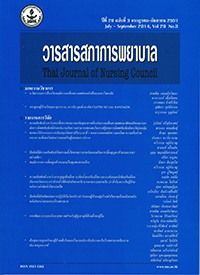ปัจจัยที่มีอิทธิพลต่อการปฏิบัติกิจวัตรประจำวันของผู้ป่วยกลุ่มโรคหัวใจขาดเลือดเฉียบพลันหลังจำหน่ายออกจากโรงพยาบาล
คำสำคัญ:
การปฏิบัติกิจวัตรประจำวัน/ การรับรู้ภาวะสุขภาพ / การเผชิญกับปัญหา/ ภาวะซึมเศร้า/ ความวิตกกังวล, acute coronary syndrome, daily routine performance, illness perception, stress coping, depression, anxietyบทคัดย่อ
บทคัดย่อ
วัตถุประสงค์ของการวิจัย: เพื่อศึกษาการรับรู้ภาวะสุขภาพ การจัดการกับปัญหา ภาวะซึมเศร้า และความวิตกกังวลต่อความสามารถการปฏิบัติกิจวัตรประจำวันของผู้ป่วยกลุ่มโรคหัวใจขาดเลือดเฉียบพลันในระยะ 3 และ 6 เดือนหลังจำหน่ายออกจากโรงพยาบาล
การออกแบบวิจัย: การวิจัยเชิงทำนาย
การดำเนินการวิจัย: กลุ่มตัวอย่างเป็นผู้ป่วยกลุ่มโรคหัวใจขาดเลือดเฉียบพลันจำนวน 100 คน ที่มารับการรักษาในโรงพยาบาลระดับตติยภูมิแห่งหนึ่งในจังหวัดเชียงราย เครื่องมือที่ใช้ในการเก็บรวบรวมข้อมูลได้แก่ แบบสอบถามข้อมูลส่วนบุคคล แบบสอบถามการรับรู้เกี่ยวกับความเจ็บป่วย แบบสอบถามการเผชิญความเครียด แบบประเมินสภาวะอารมณ์เศร้า แบบประเมินความวิตกกังวล และแบบประเมินความสามารถในการปฏิบัติกิจวัตรประจำวัน วิเคราะห์ข้อมูลโดยใช้สถิติเชิงพรรณนา สัมประสิทธิ์สหสัมพันธ์ของเพียร์สัน และการถดถอยพหุคูณแบบขั้นตอน
ผลการวิจัย: พบว่า ภาวะซึมเศร้าสามารถทำนายการปฏิบัติกิจวัตรประจำวันในผู้ป่วยกลุ่มโรคหัวใจขาดเลือดเฉียบพลันหลังจำหน่ายออกจากโรงพยาบาล 3 เดือน ได้ร้อยละ 9.1 ภาวะซึมเศร้าและการจัดการกับปัญหาสามารถทำนายความสามารถในการทำกิจวัตรประจำวันหลังจำหน่ายออกจากโรงพยาบาล 6 เดือนได้ร้อยละ17.3
ข้อเสนอแนะ: บุคลากรสุขภาพควรส่งเสริมการปฏิบัติกิจวัตรประจำวันของผู้ป่วยโรคหัวใจขาดเลือดเฉียบพลันหลังจำหน่ายโดยป้องกันการเกิดภาวะซึมเศร้าและส่งเสริมการจัดการกับปัญหาที่เหมาะสม
Abstract:
Objective: To study how the factors of illness perception, stress coping, depression and anxiety affected acute coronary syndrome patients’ performance of their daily routines 3 and 6 months after discharge.
Design: Correlation research.
Implementation: The subjects were 100 post-discharge acute coronary syndrome patients being treated in a tertiary hospital in Chiang Rai Province. The instruments used to collect data were (i) a Personal Information Questionnaire; (ii) a revised Illness Perception Questionnaire; (iii) Jalowiec Coping Scale; (iv) the Self-Rate Anxiety Scale; (v) the Depression Inventory; and (vi) Duke Activity Status Index. The data were analysed using Descriptive Statistics, Pearson’s Correlation Coefficients and Multiple Regression.
Results: Depression was a factor that predicted daily routine performance of 9.1 percent of the acute coronary syndrome patients 3 months after discharge. Depression and stress coping combined were a factor that predicted daily routine performance of 17.3 percent of the acute coronary syndrome patients 6 months after discharge.
Recommendations: Nurses caring for this group of patients are advised to encourage the patients to adopt a proper stress-coping and depression-reducing means, to help them become more able to perform their daily routines.








